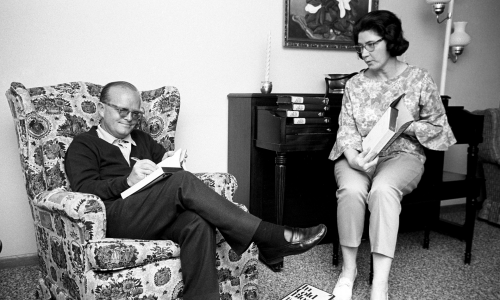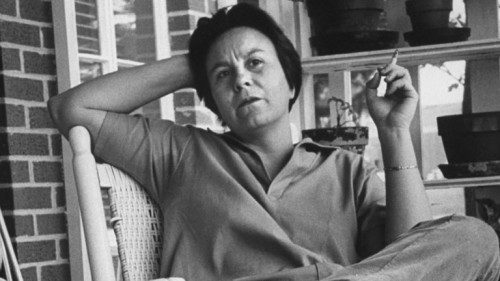
You are going to read a lot of articles this Monday morning about the impact that Harper Lee made on America. She encouraged empathy, exposed systemic racism, and arguably altered this nation’s history. You should definitely read those pieces. This is not one of them.
Harper Lee only wrote one book. Twice. And she got all kinds of flak for her lack of a literary canon. But Ms. Lee stood her ground. And, for that–in my book–Harper Lee was a bosslady.
Yeah, I said it.
In a world that demands more and more, she bravely gave her speech and sat down. I imagine that she went on with her life in the small town South. She had friends and family. She was courageously average. She had gifted the world with a radically different way of looking at things. And really, that was more than enough.

“How could she have only written one book?” her critics often pondered. Many suggested that her lifelong friend, Truman Capote, must have helped. Ms. Lee did not expect the acclaim that To Kill a Mockingbird garnered. In a 1964 interview with Roy Nequist she said:
“You see, I never expected any sort of success with Mockingbird. I didn’t expect the book to sell in the first place…I hoped for a little, as I said, but I got rather a whole lot, and in some ways this was just about as frightening as the quick, merciful death I’d expected.”
For her candidness and self-awareness, I marvel even more. Ms. Lee tasted fame in a profound way and seemed to just turn down the possibility of it creeping back up again. I often wondered if Ms. Lee stopped publishing because the world became more and more demanding of celebrity in the years that followed her rise to fame. I cannot imagine what it must have been like to have become incredibly famous when “The Twist” was on the charts and to have died at a time when millions of people watch videos of cats riding on vacuums. How vulnerable and frightening fame’s shift must have seemed. And really, how tempestuous and bizarre it really is.
I am sure that her legacy will be “To Kill a Mockingbird/Go Set a Watchman,” but I do not doubt that there will always be those who question why she never wrote more. Honestly, it is this question of more and enough that I often think of when I consider Ms. Lee. We live in a world haunted by production and results. Where did you go to school? Have you been published? Do you have a thigh gap? Perhaps it is just the whimsy of my mind, I like to think that Ms. Lee looked to the world and said:
Enough about your question of my enough-ness.
Celebrity culture (literary, cinematic, or Youtube feline) means that you have to keep production up every single day. Often this means we get bombarded with the same old message done in sexier ways. And of course, this debilitating practice pushes the everyday person at least as much as the famous one.
These days, we can get very caught up in the idea of “doing enough,” of being #worldchangers. Churches must include Service or Outreach as a major part of their websites. Politicians and preachers alike, tell us to do more and be more. And lately, I’ve been around enough high school students to know that “service hours” are a part of their vernacular. It’s strange, when I was a kid you had to do “service hours” because you’d gotten caught vandalizing the side of a building or driving too fast. Now, all the high school kids we know have these excessive amounts of service hour goals in addition to their classwork. It isn’t enough to study and inwardly digest information. Nope. Now we have to see results based education on all fronts.
In our fury of doing and accomplishment, I often worry that we will miss the stories that change the way we see life. We will miss the still, small voice nudging us beyond our self-calculating ways. We will be too busy to hear the Atticus Finches:
I wanted you to see what real courage is, instead of getting the idea that courage is a man with a gun in his hand. It’s when you know you’re licked before you begin, but you begin anyway and see it through no matter what. You rarely win, but sometimes you do.
Will we see weakness as strength? Humility as hopeful? And suffering as Gospel? Will we be quiet enough to let our views of the world be altered by the soft spoken words of others? I hope so.
We will miss you, Ms. Harper Lee. You were more than enough.

COMMENTS
5 responses to “Harper Lee: To Kill An Expectation of ‘More’”
Leave a Reply














Great piece. I wish I could remember which work it’s in, but Luther once summarized the qualifications of a preacher as (I’m paraphrasing, obviously) being able to: a) stand up in front of people, b) open her mouth and have words come out, c) close her mouth and sit down. C is essential and underrated. Ms. Lee did all three.
The words of Atticus Finch that Sarah quoted at the end of her reflection remind me of this story — “The Power of Futile Speeches” — from a former parishioner in Minnesota who used to teach law at Baylor University: http://www.huffingtonpost.com/mark-osler/the-power-of-futile-speec_b_878186.html
Thank you for this, Sarah. I’ve always imagined that Lee just knew her work was complete, and I admired her resistance to the expectation that she somehow owed the world more than that.
“Less is more.” Enough said.
Thanks for such a prophetic, timely, culture-engaged, Gospel-graced article. Love the work you do because of reflection like this.